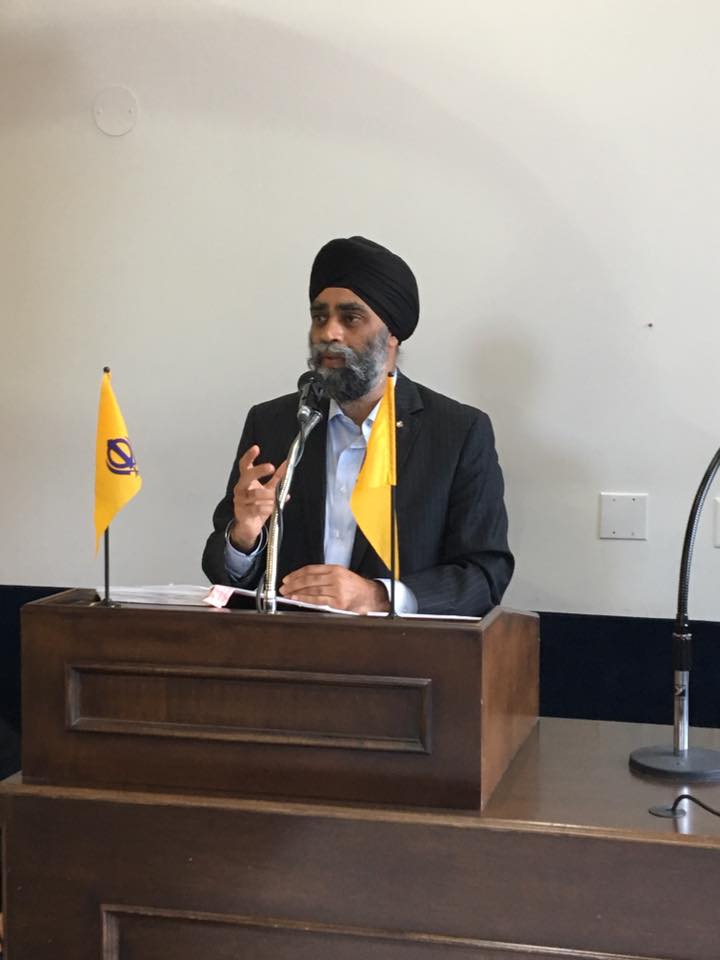
OTTAWA –Defence Minister Harjit Sajjan says the federal government is concerned about a new outbreak of fighting in Ukraine and is looking at ways to “improve” Canada’s military support to the country.
“I’m looking at the options right now in terms of how we can improve our support, what changes that we need to make,” Sajjan said Wednesday.
“But one thing is for sure, that Canada remains committed to Ukraine.”
Government forces and Russian-backed rebels have traded heavy fire in eastern Ukraine over the last few days, killing at least 19 people and injuring dozens more.
The surge in violence is threatening to overturn a ceasefire in the three-year-old civil war that has been repeatedly broken by both sides, but is still seen as the best chance for peace.
It also comes amid uncertainty over U.S. intentions in the region, including whether it will continue to stand with Ukraine given President Donald Trump’s comments about mending relations with Russia.
Canada first deployed about 200 troops to Ukraine in the summer of 2015 to help train government forces after Russia annexed Crimea and began supporting separatist forces in Ukraine’s Donbass region.
The mission, which Prime Minister Justin Trudeau toured during a visit to the country in July, has so far resulted in 2,600 Ukrainian troops being trained primarily in the basic soldiering.
But the mission is set to expire at the end of March and the Liberal government had been non-committal on an extension despite public appeals from the Ukrainian government.
Sajjan’s comments, coming a few weeks after the British extended their own training mission, are the strongest indication yet that Canada will maintain, and may even expand, its military presence in Ukraine.
“I’ve always said when we send troops, we want to make sure they have a meaningful impact,” Sajjan said. “And we are having a meaningful impact in Ukraine.”
Conservative defence critic James Bezan said he hopes the Liberal government not only extends the current training mission, but expands military support in other ways.
That includes providing military equipment to the Ukrainians and satellite imagery, as the previous Conservative government did.
“At some point in time we have to make a decision that Ukraine needs our help,” Bezan said.
“They’re fighting a war against Russian imperialism and if they fail, then it’s right on NATO’s doorstep. So they definitely need the support and training. They definitely need the support with satellite images. They should at the very least be supplying non-kinetic equipment.”
Canada’s large and influential Ukrainian community has also made it clear that it wants the government continue to provide military assistance to the eastern European country.
But there have been misgivings inside the Canadian Forces, with some grumbles the military is being stretched thin as it prepares to send troops to Latvia and Africa while also supporting the mission in Iraq.
There are also concerns about ongoing problems with corruption among the Ukrainian military, particularly at the top levels.
Sajjan said he was confident, based on defence chief Gen. Jonathan Vance’s assessment, that the Canadian Forces is not being overstretched.
And while he acknowledged corruption remains an issue, Sajjan said Canada will continue to work with Ukrainian authorities to ensure the problem is addressed.
“We have to make sure we have the confidence of the population,” he said.
“I’m confident that we’ll keep moving in that direction, and we’ll also make sure that as we move forward, that we’ll help them with any efficiencies that they need as well.”
Sajjan did not say when a decision would be made on whether to extend the mission, though officials say options have been drawn up by the military and will be presented to cabinet in the coming weeks.
Andriy Shevchenko, Ukraine’s ambassador to Canada, expressed frustration in an interview last month with how long things were taking.
“Those people who sit in the Kremlin and plan their other terrible activities in Ukraine, the sooner they learn that the West and Canada is serious about future co-operation, the better it is,” he said.